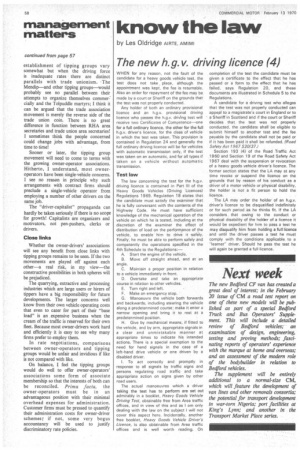know the law
Page 60

If you've noticed an error in this article please click here to report it so we can fix it.
by Les Oldridge AIRTE, AMIMI
The new h. g.v. driving licence (4)
WHEN for any reason, not the fault of the candidate for a heavy goods vehicle test, the test does not take place, although the appointment was kept, the fee is returnable. Also an order for repayment of the fee may be made by a court or Sheriff on the grounds that the test was not properly conducted.
Any holder of both an ordinary provisional licence and an h.g.v. provisional driving licence who passes the h.g.v. driving test will receive two Certificates of Competence—one for a full ordinary licence, the other for the full h.g.v. driver's licence, for the class of vehicle in which the test was taken. This provision is contained in Regulation 24 and generally the full ordinary driving licence will be for vehicles with automatic transmission only, if the test was taken on an automatic, and for all types if taken on a vehicle without automatic transmission.
Test law The law concerning the test for the h.g.v. driving licence is contained in Part III of the Heavy Goods Vehicles (Driving Licences} Regulations 1969. Regulation 18 states that. the candidate must satisfy the examiner that he is fully conversant with the contents of the Highway Code. He must have sufficient knowledge of the mechanical operation of the vehicle on which he is tested, including at the discretion of the examiner the effect of distribution of load on the performance of the vehicle, to enable him to drive it safely. Finally, he must be able to perform safely and competently the operations specified in the 4th Schedule to the Regulations;—
A. Start the engine of the vehicle.
B. Move off straight ahead, and at an angle.
C. Maintain a proper position in relation to a vehicle immediately in front.
D. Overtake and take an appropriate course in relation to other vehicles.
E. Turn right and left.
F. Make an emergency stop.
G. Manoeuvre the vehicle both forwards and backwards; including steering the vehicle along a predetermined course; make it enter a narrow opening and bring it to rest at a predetermined position.
H. Give by mechanical means, if fitted to the vehicle, and by arm, appropriate signals in a clear and unmistakable manner at appropriate times to indicate his intended actions. There is a special exemption to the need for hand signals in the case of a left-hand drive vehicle or one driven by a disabled driver.
I. To act correctly and promptly in response to all signals by traffic signs and persons regulating road traffic and take appropriate action on signs given by other road users.
The actual manoeuvres which a driver taking the test has to perform are set out admirably in a booklet, Heavy Goods Vehicle Driving Test, obtainable free from Area traffic offices, and in view of this and as I. am only dealing with the law on the subject I will not cover this aspect here. Incidentally, another free booklet, Heavy Goods Vehicle Driver's Licence, is also obtainable from Area traffic offices and is well worth reading. On completion of the test the candidate must be given a certificate to the effect that he has passed or a form to the affect that he has failed, says Regulation 20, and these documents are illustrated in Schedule 5 to the Regulations.
A candidate for a driving test who alleges that the test was not properly conducted can appeal to a magistrate's court in England or to a Sheriff in Scotland and if the court or Sheriff decides that the test was not properly conducted, the candidate shall be eligible to submit himself to another test and the fee payable by the candidate shall not be paid or if it has been paid it shall be refunded. (Road Safety Act 1967 520(37.) Section 193 (4) of the Road Traffic Act 1960. and Section 19 of the Road Safety Act 1967 deal with the suspension or revocation of a heavy goods vehicle driver's licence. The former section states that the LA may at any time revoke or suspend the licence on the grounds that by reason of his conduct as a driver of a motor vehicle or physical disability, the holder is not a fit person to hold the licence.
The LA may order the holder of an h.g.v. driver's licence to be. disqualified indefinitely or for such period as he thinks fit. If the LA considers, that owing to the conduct or physical disability of the holder of a licence it would be expedient for him to pass a test he may disqualify him from holding a full licence and until the driver passes a test he must comply with the conditions applicable_ to a "learner" driver. Should he pass the test he will again be granted a full licence.




































































